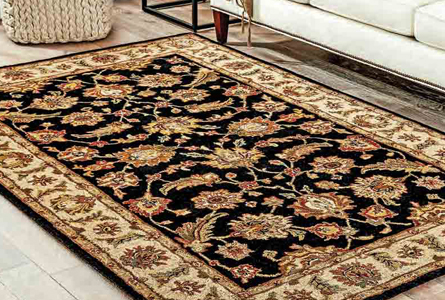Weaving Success and Beauty

Jaipur Rugs is one of India’s largest manufacturers of hand knotted rugs. Founded in 1978 and headquartered in Jaipur, India, the company operates in six states and 600 villages in India with distribution to over 40 countries with its independent base of over 40,000 artisans. They also serve as a social innovator for artisans by providing job opportunities that uplift rural India. Nand Kishore Chaudhary, Managing Director and Chairman, Jaipur Rugs; and Yogesh Chaudhary, Director, Jaipur Rugs, discuss the brand’s journey and its social impact.

Nand Kishore Chaudhary, Founder, began Jaipur Rugs in 1978 with two looms and nine artisans. Today it is the largest handmade rugs manufacturer in India. How does it feel to have created a legacy brand? The world-famous social entrepreneur shares, “It was nearly four decades ago when I conceptualised Jaipur Rugs and decided to work with people whom everybody considered untouchables. At that time, people thought that I was committing a mistake by associating with these people but deep down inside I knew that this was the start of something special. I feel privileged and humbled by the love and blessing people bestowed on Jaipur Rugs in the last 44 years.”
Alongside, he gives credit to the younger generation of his family for being instrumental in taking the brand to a global stage and making it a preferred choice for every design enthusiast in the country and abroad.
Ask what were his reasons to use the age-old art form of handmade carpets and revolutionise the carpet industry by creating an entirely new business model - working directly with artisans, and he responds, “The larger part of India’s landscape is represented by the rural communities and these communities are largely dependent on either agriculture or hand craft. The advent of industrialisation impacted the hand craft industry and diminished its sheen to a level where everyone decided to leave and shift to some other profession. The artisan community was no different and was deeply impacted and were unable to fulfill their basic necessities.”
Being totally in awe of the art, he decided to work and promote the same by working with these artisans directly - removing the middlemen. “This way, the artisans could get more money out of the hard work and emotions that they weave for months to come up with a finished product,” he explains. “Secondly, I want these people to be a part of the mainstream society and convert these artisans into artists. Today, people from India and abroad come to meet them and learn the mesmerising art of hand weaving,” he shares with pride.
Thirdly, he was simply amazed by the energy and dedication of the female weavers in the villages and desired to do something about their upliftment. With a deep sense of satisfaction, he reveals that today 85% of Jaipur Rugs artisans are female. “Our constant effort has resulted in making them a more active part of society. We are proud that these women today are considered as the role models in our weavers’ family who have even gone to international locations to receive awards for their creativity and designs!”
Mr Chaudhary sums up the very brand philosophy of Jaipur Rugs as an attempt to promote and preserve the age-old dying art of hand weaving as well as a tool to bring prosperity into the homes of those 40,000 rural artisans across five states.
"My family, along with the people of society, were not very comfortable that I was working with the artisans. I was practically shunned by my family and society"
- Nand Kishore Chaudhary
 Nand Kishore Chaudhary
Nand Kishore Chaudhary
Needless to say, the path wasn’t smooth. “The challenges were immense and the road was full of difficulties and that’s why I say ‘I am a student of University of Hard Rocks of Life!” he quips, as he lists out the hurdles encountered… “When I started, the weavers that I was working with were considered untouchables and I belonged to a very conservative Marwari family. My family, along with the people of society, were not very comfortable that I was working with the artisans. I was practically shunned by my family and society. I was not even allowed to participate in functions and ceremonies by my relatives because of working with the artisan community.” But, without a second thought, he continued working with the artisans.
Another challenge was shifting to Gujarat and living in a tribal area for ten years. The tribals in Gujarat were not very receptive of outsiders; establishing roots and building trust among the tribal community was a difficult task. “It took me several years to establish credibility with these people and to convince them that my intentions were only to help them and to bring them to the mainstream society,” Mr Chaudhary explains.
Ask him what are the key individual strengths that he and his son, Yogesh Chaudhary, bring to the organisation, and he maintains, “I believe our father and son pair has removed certain unnecessary obstacles from our journey and moved the business to great heights. It has successfully established Jaipur Rugs as the most trusted brand in the carpet industry. We both have our own particular individual strengths in such a way that today, our organisation utilises above 40,000 weavers and craftsmen from 600 villages from five different states of India. I started the company with two looms and nine artisans, and followed the values of human-dignity and equality. Taking this legacy forward, my son has revolutionised the handmade carpet industry by eliminating the key problems of the industry and the company and provided sustainable livelihood to thousands of artisans at their doorstep. His idea of collaborating with world renowned designers paved the way in positioning Jaipur Rugs on the world map.”
It is a mark of his deep sense of fulfilment that he responds-were he given the chance to start all over again, “I would follow the same path and trajectory!”
Our conversation moves to Jaipur Rugs – director, Yogesh Chaudhary, who had joined his father in 2006 – a time when the industry was rife with malpractices. “The scenario of the industry was in a very sad state as most of the end consumers were misguided and had no idea of the right quality, size or shape that would suit their requirement. The market was full of opportunistic traders who were only interested in selling the product and earning profit,” he explains.
Yet he carved a different path. Choosing to follow the values of human dignity and equality, he revolutionised the handmade carpet industry by providing sustainable livelihood to thousands of artisans at their doorstep. How difficult was this to achieve? Did it also mean a reduction in profitability for Jaipur Rugs?
“The organisation was set up with a vision to improve the lives of artisans and in the meanwhile also to run a successful business,” he states. “With the right approach and keeping our values intact, we are trying to fulfil both the responsibilities to the best of our ability and helping the world to be a better place in our own limited way.”
Eliminating the exploitative middlemen-owned looms and providing sustainable livelihood to thousands of artisans at the bottom of the pyramid was one of the biggest achievements by Jaipur Rugs. “The rural artisans were given their own looms at their respective places and were provided with a sustainable livelihood at their doorstep. Of course, it took a lot of manpower, strategic planning and many other elements to achieve this goal,” he admits.
Today, Jaipur Rugs has flagship stores across India, as well as stores in in Milan (Italy), Atlanta (USA), Russia and three store-in-stores in China. They also export to over 80 countries. Speaking of their experience of the foreign market, he shares, “Jaipur Rugs started as an export company and since then we have been supplying to international markets and customers. As of now, we export 85% of our products and the response has been tremendous from across the globe for all of our collections. This experience has helped and encouraged us to expand our footprint at other locations as well and soon we will announce our foray into new international markets.”
Under the leadership of the younger Mr Chaudhary, the company grew to a strength of 7000 looms. Not a small achievement by any standards! “The idea was simple: you have to be honest in what you do and work for the betterment of your stakeholders whether it is weavers, customers or people associated with the company,” he explains. “The decision to work with artisans directly resulted in more salary/ wages to them. Weavers from various places were and still are inclined to work, once they came to know that they can earn more than what they used to. Once they saw the benefit, they were gracious enough to spread this news. We also conduct sessions to identify prospective weavers for the company and provide them with all the necessary training and education that is required for them.”
Jaipur Rugs was also an early mover in the Indian retail market, launching a store in New-Delhi in 2015 – much ahead of its peers in the sector. He shares that Jaipur Rugs was exporting all its products and had no presence in the retail market before 2015. During a visit to a friend, they decided to visit the market and explore carpet stores. “And what I saw surprised me - retailers were only interested in selling their products and the buyers were totally dependent on the information supplied by these retailers. Communication was vague and the consumer has no idea what is good for them.” This spurred his decision to not only foray into retail but also educate the buyer about the product as well, resulting in the first Jaipur Rugs store at Delhi.
"With the right approach and keeping our values intact, we are trying to fulfil both the responsibilities to the best of our ability and helping the world to be a better place in our own limited way"
- Yogesh Chaudhary
 Yogesh Chaudhary
Yogesh Chaudhary
Today, the brand has been widely recognised on a global stage, winning several prestigious global awards. The reason behind the attention and recognition it wins is their artisans, who, he believes, “not only weave, but put their emotions into the carpets.” He cites the brand’s acclaimed collection Manchaha, which won several awards in the international arena, as a true example of this. The collection was an effort to explore the inner feelings of the artisans. “When you are working from your heart, it tends to come out exclusive,” he smiles, adding, “All our products are a true example of love, empathy and belongingness and that is what makes Jaipur Rugs a cut above the competition.”
With a whopping 85% of the 40,000 artisans that Jaipur Rugs engages being female, the impact on families, livelihoods, and women’s empowerment is tremendous. “Women in villages are a true example of grit, determination, courage and leadership,” he declares. “Previously-and now as well-they are not allowed to work - leave aside go outside for work. When we decided to place looms at their houses, they were keen to embrace this new role of entrepreneur. They are now independent, more financially safe, can provide good education to their children and can support their household as well. The jobs at their respective place also helped in reverse migration of the population as almost all the male members used to go to big cities for work. Now, when they have work at home, they are returning to their roots and enjoying living with their families.”
‘It’s easy to make a buck. It’s a lot tougher to make a difference,’ wrote Tom Brokaw. Kudos to Jaipur Rugs for achieving both!
JAIPUR RUGS FOUNDATION AND ITS INITIATIVESCommunication
Some of the initiatives taken up by the Foundation include:
- Trainings and Upskilling – A six-month programme consisting of 2-hour regular classes teaching basic literacy, understanding health, hygiene and life skills that help women gain self-confidence to become self-sustaining. The educated women of the community become teachers, and are given training to participate effectively.
- Hunarshala – This initiative for children develops a culture of self-designed learning, where children work on innovative projects based on their interests. A facilitator guides and assists them through activities such as sports, arts & craft, computer technology, robotics, music, and dance.
- Transforming Lives through Upskilling - In collaboration with Royal Rajasthan Foundation, the two initiatives-namely, Social innovation & Design Lab and Skill Development for Sustainable Livelihood-work to build a more equitable ecosystem for women by creating economic opportunities.
- Social Innovation and Design Lab - Developed as an experimentation and knowledge hub for women artisans and designers in the rural clusters, it generates ideas and insights, design prototypes and enables knowledge sharing about scalable innovations within the crafts and design stream that will sustain the livelihoods in the villages.
- Freedom Manchaha – This sustainable initiative for long-term prisoners enables them to design their own rug spontaneously on the loom. A section of society set-up for failure is transformed through income and self-expression to heal themselves and create a spark to bring change in their lives.